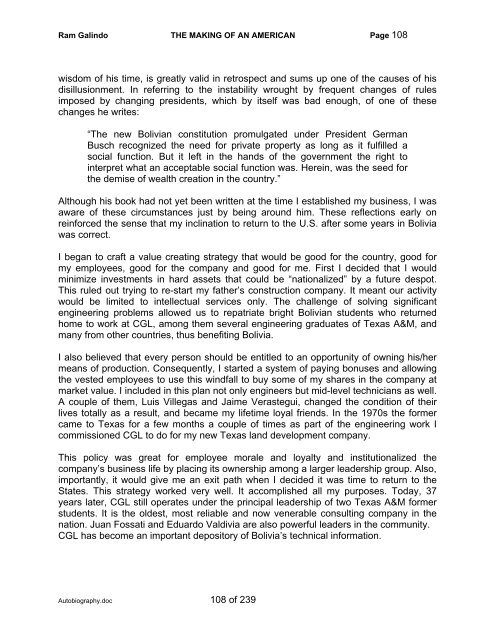Autobiography - The Galindo Group
Autobiography - The Galindo Group
Autobiography - The Galindo Group
You also want an ePaper? Increase the reach of your titles
YUMPU automatically turns print PDFs into web optimized ePapers that Google loves.
Ram <strong>Galindo</strong> THE MAKING OF AN AMERICAN Page 108<br />
wisdom of his time, is greatly valid in retrospect and sums up one of the causes of his<br />
disillusionment. In referring to the instability wrought by frequent changes of rules<br />
imposed by changing presidents, which by itself was bad enough, of one of these<br />
changes he writes:<br />
“<strong>The</strong> new Bolivian constitution promulgated under President German<br />
Busch recognized the need for private property as long as it fulfilled a<br />
social function. But it left in the hands of the government the right to<br />
interpret what an acceptable social function was. Herein, was the seed for<br />
the demise of wealth creation in the country.”<br />
Although his book had not yet been written at the time I established my business, I was<br />
aware of these circumstances just by being around him. <strong>The</strong>se reflections early on<br />
reinforced the sense that my inclination to return to the U.S. after some years in Bolivia<br />
was correct.<br />
I began to craft a value creating strategy that would be good for the country, good for<br />
my employees, good for the company and good for me. First I decided that I would<br />
minimize investments in hard assets that could be “nationalized” by a future despot.<br />
This ruled out trying to re-start my father’s construction company. It meant our activity<br />
would be limited to intellectual services only. <strong>The</strong> challenge of solving significant<br />
engineering problems allowed us to repatriate bright Bolivian students who returned<br />
home to work at CGL, among them several engineering graduates of Texas A&M, and<br />
many from other countries, thus benefiting Bolivia.<br />
I also believed that every person should be entitled to an opportunity of owning his/her<br />
means of production. Consequently, I started a system of paying bonuses and allowing<br />
the vested employees to use this windfall to buy some of my shares in the company at<br />
market value. I included in this plan not only engineers but mid-level technicians as well.<br />
A couple of them, Luis Villegas and Jaime Verastegui, changed the condition of their<br />
lives totally as a result, and became my lifetime loyal friends. In the 1970s the former<br />
came to Texas for a few months a couple of times as part of the engineering work I<br />
commissioned CGL to do for my new Texas land development company.<br />
This policy was great for employee morale and loyalty and institutionalized the<br />
company’s business life by placing its ownership among a larger leadership group. Also,<br />
importantly, it would give me an exit path when I decided it was time to return to the<br />
States. This strategy worked very well. It accomplished all my purposes. Today, 37<br />
years later, CGL still operates under the principal leadership of two Texas A&M former<br />
students. It is the oldest, most reliable and now venerable consulting company in the<br />
nation. Juan Fossati and Eduardo Valdivia are also powerful leaders in the community.<br />
CGL has become an important depository of Bolivia’s technical information.<br />
<strong>Autobiography</strong>.doc 108 of 239


